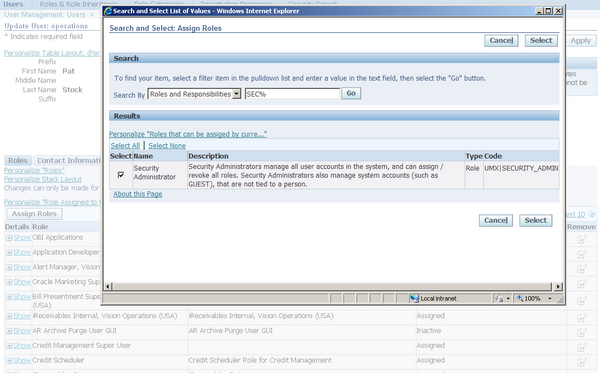System Administrator – Security

Release 12 of Oracle Applications provides significant enhancements to the Oracle Applications security system. Core Security now includes a Role Based Access Control model that builds on the existing Function Security and Data Security models. A new set of administrative features that build on Core Security are also introduced in this release.
Oracle User Management
Oracle User Management is a secure and scalable system that enables organizations to define administrative functions and manage users based on specific requirements such as job role or geographic location. With Oracle User Management, instead of exclusively relying on a centralized administrator to manage all its users, an organization can create local administrators and grant them sufficient privileges to manage a specific subset of
the organization’s users. This provides the organization with a more granular level of security, and the ability to make the most effective use of its administrative capabilities.
Oracle’s function and data security models constitute the base layers of this system, and contain the traditional system administrative capabilities. Organizations can optionally add more layers to the system, depending on the degree of flexibility they require.
Key features of Oracle User Management include:
Role Based Access Control (RBAC) – Enables organizations to create roles based on specific job functions, and to assign these roles the appropriate permissions. With RBAC, administrative privileges and user access are determined by assigning individuals the appropriate roles.
Delegated Administration – Enables system administrators to delegate some of their administrative privileges to individuals that manage a subset of the organization’s users. These individuals are assigned administrative privileges for a limited set of roles that they can assign to the users they manage.
Registration Processes – Enable organizations to provide end-users with a method for requesting various levels of access to the system, based on their eligibility. Registration processes also simplify an administrator’s job by providing streamlined flows for account maintenance and role assignment.
Self Service Requests and Approvals – Enable end users to request initial access or additional access to the system.
Oracle Application Object Library Security
Oracle Application Object Library security comprises two main components, Function Security and Data Security.
Function Security restricts user access to individual menus of functions, such as forms, HTML pages, or widgets within an application. Function Security by itself restricts access to various functions, but it does not restrict access to the data a user can see or what actions a user can perform on that data.
Data Security restricts the access to the individual data that is shown once a user has selected a menu or menu option. For example, with Data Security you can control the set of users that a particular local security administrator can access within Oracle User Management. In conjunction with Function Security, Data Security provides additional
access control on data that a user can see or actions a user can perform on that data.
User and Data Auditing
Oracle Applications allows you to audit users and changes they make to application data.
The Sign-On Audit feature allows you to track your users’ activities. You can choose who to audit and what type of user information to track. Sign-On Audit reports give you historical, detailed information on your users’ activities within an application. Also, the Monitor Users form allows you to view online, real-time information on user activity.
AuditTrail lets you keep a history of changes to important data: what changed, who changed it, and when. With AuditTrail, you can easily determine how any data row or element obtained its current value. You can track information on most types of fields, including character, number, and date fields.
Security Administrators manage all user accounts in the system, and can assign / revoke all roles. Security Administrators also manage system accounts (such as GUEST), that are not tied to a person.


Leave a Reply
Want to join the discussion?Feel free to contribute!